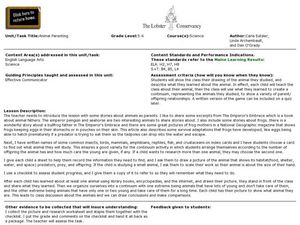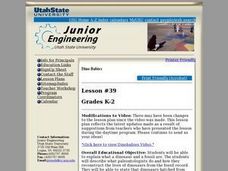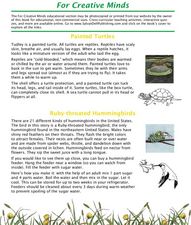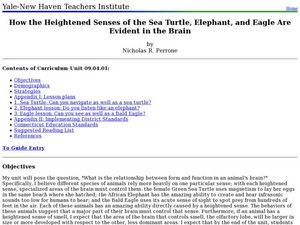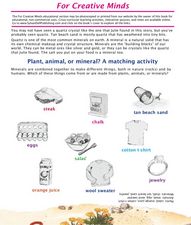Curated OER
Animal Parenting
Students analyze parenting instincts. In this parenting instincts lesson, students view a drawing of animal they studies and describe what they learned about the animal. Students teach the class about their animal and the class creates a...
Curated OER
Creature Features
Students examine why certain animals live in only specific places throughout the world. Using animals, they classify them based on their characteristics and identify their basic needs. They also observe and compare the life cycles of...
Curated OER
Dino Babies
Students distinguish between dinosaurs and fossils. They escribe what paleontologists do and how they reconstruct the lives of dinosaurs from the fossil record. In addition, they state that dinosaurs hatched from eggs.
Curated OER
For Creative Minds: Tudley Didn't Know
Students discover facts about the animals in John Himmselman's book, Tudley Didn't Know, and make a paper turtle. In this marsh animals lesson, students first read the book Tudley Didn't Know. Students read facts about painted turtles,...
Curated OER
Where Are the Dinosaurs
Students explore the concept of extinction. In this dinosaur lesson, students view a video and have a class discussion about the extinction of dinosaurs. They create a dinosaur egg and imagine what life would be like for a dinosaur.
Curated OER
How the Heightened Senses of the Sea Turtle, Elephant, and Eagle Are Evident in the Brain
Students explore the senses of different animals. In this biology lesson plan students will study the animals selected for their grades. The students will learn about the brain and how the senses of that animal have developed.
Curated OER
Sponges, Cnidarians, Flatworms, and Roundworms
In this simple animals worksheet, students review the characteristics of sponges, cnidarians, flatworms, and roundworms. This worksheet has 12 matching questions.
Curated OER
Endangered Species
Students define the terms endangered and threatened. They identify the factors that can cause species to become endangered. They discover how animals are protected by the Endangered Species Act.
Curated OER
For Creative Minds
Learners study pictures of plants, animals, and minerals. Students classify the pictures into the three groups. In this rock identification lesson, learners complete a rock finding lab experiment by finding, cleaning, identifying, and...
Curated OER
From Flower to Fruit
Pupils examine how flowers have essentially four parts. They learn both the male and female reproductive parts of the flower, then explore self-pollination and pollination by insects and other animals.
Curated OER
Farm Products Help Me Grow
Young scholars view a display of empty food containers (or illustrations). They select a food and decide as a class if it has an animal or plant origin. Students view a display of common farm animals that are commonly eaten (cow, pig,...
Curated OER
Worksheet 2. Singular Nouns
In this singular nouns worksheet, learners write the 12 words, with an "a" or "an" before them, in the correct column. The words are all nouns and the columns are "Foods", "Animals", and "Occupations".
Curated OER
Antarctic Similes
In this Antarctic similes worksheet, students review the definition of this type of figurative language and then write 5 similes about Antarctic animals illustrating 1 of them.
Curated OER
Animal Rhymes
In this animal activity worksheet, students use their language skills to solve 14 rhyme riddles that are related to different animals.
Curated OER
Dinosaurs 1: Where Are the Dinosaurs?
Students explore dinosaurs. In this dinosaur identification lesson, students watch video clips for different dinosaurs from the Discovery Kids website. Students discuss the clips with their teacher. Students may then role play the...
Curated OER
Where Are the Dinosaurs?
Students study dinosaurs by completing two activities and group discussion. For this dinosaur lesson, students discuss dinosaurs and extinction as a class. Students make dinosaur dioramas, a hatchable dinosaur egg after watching a video...
Curated OER
Dinosaurs 1: Where are the Dinosaurs?
Students study dinosaurs and explore the concept of extinction. In this dinosaur lesson students create dinosaur eggs and view dinosaur dioramas.
Curated OER
Scientific Classification
In this scientific classification worksheet, students read about classification and the questions scientists ask in order to classify, then read about features of different classifications of animals. Worksheet is informational, no...
Curated OER
School Yard Park/ Ecosystem
Fifth graders examine ecosystems in their schoolyard. In this nature and ecosystem lesson, 5th graders map their schoolyard into workable plots. They classify plants and animals found in the plot. They revisit their site every two weeks...
Curated OER
Life Cycle of Frogs
In this frogs worksheet, students analyze and color a diagram of the life cycle of frogs from egg to tadpole to full-grown frog.
Curated OER
Brown Bear
Students read the book Brown Bear, Brown Bear, What Do You See? and respond to the questions asked by the teacher. In this comprehension lesson plan, students respond to the animals in the book.
Curated OER
Hummingbird Nests
Now here's a hands-on activity that little ones are sure to love. Using melted chocolate, coconut, and jelly beans they'll be able to shape tiny nests perfect for tiny birds. Kids love getting their hands dirty and the tactile experience...
It's About Time
Organizing a Store
When provided with multiple objects, how many ways can the class organize and display them based on predetermined factors? Assist class members with a handy activity—theoretically teaching them concepts to understand periodic...
Curated OER
What Do We Learn From Fossils?
Students investigate what a fossil is and how it came to be. In this fossil lesson, students examine pictures of skeletons and identify characteristics that can and cannot be determined by a fossil. Students complete diagrams...


